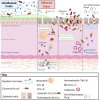Microenvironmental Factors that Shape Bacterial Metabolites in Inflammatory Bowel Disease
- PMID: 35959366
- PMCID: PMC9362432
- DOI: 10.3389/fcimb.2022.934619
Microenvironmental Factors that Shape Bacterial Metabolites in Inflammatory Bowel Disease
Abstract
Inflammatory bowel disease (IBD) is a significant global health problem that involves chronic intestinal inflammation and can involve severe comorbidities, including intestinal fibrosis and inflammation-associated colorectal cancer (CRC). Disease-associated alterations to the intestinal microbiota often include fecal enrichment of Enterobacteriaceae, which are strongly implicated in IBD development. This dysbiosis of intestinal flora accompanies changes in microbial metabolites, shaping host:microbe interactions and disease risk. While there have been numerous studies linking specific bacterial taxa with IBD development, our understanding of microbial function in the context of IBD is limited. Several classes of microbial metabolites have been directly implicated in IBD disease progression, including bacterial siderophores and genotoxins. Yet, our microbiota still harbors thousands of uncharacterized microbial products. In-depth discovery and characterization of disease-associated microbial metabolites is necessary to target these products in IBD treatment strategies. Towards improving our understanding of microbiota metabolites in IBD, it is important to recognize how host relevant factors influence microbiota function. For example, changes in host inflammation status, metal availability, interbacterial community structure, and xenobiotics all play an important role in shaping gut microbial ecology. In this minireview, we outline how each of these factors influences gut microbial function, with a specific focus on IBD-associated Enterobacteriaceae metabolites. Importantly, we discuss how altering the intestinal microenvironment could improve the treatment of intestinal inflammation and associated disorders, like intestinal fibrosis and CRC.
Keywords: Escherichia coli; colorectal cancer; inflammation; inflammatory bowel disease; metabolites; metal; microbiota; therapeutics.
Copyright © 2022 Lopez, Ahn, Alves and Arthur.
Conflict of interest statement
The authors declare that the research was conducted in the absence of any commercial or financial relationships that could be construed as a potential conflict of interest.
Figures

References
Publication types
MeSH terms
Grants and funding
LinkOut - more resources
Full Text Sources

